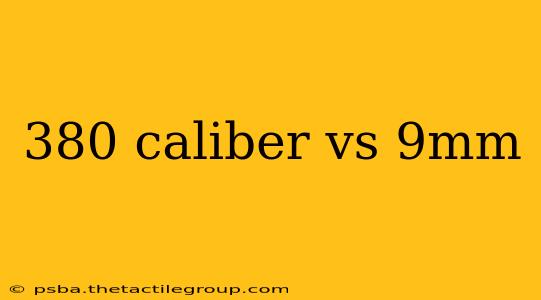Choosing the right caliber for self-defense or personal protection is a crucial decision, demanding careful consideration of various factors. This in-depth comparison of the .380 ACP (Automatic Colt Pistol) and the 9mm Parabellum (also known as 9x19mm) will help you understand the key differences and determine which might be a better fit for your needs.
Ballistics: Power and Penetration
The most significant difference between the .380 ACP and 9mm lies in their ballistic performance. The 9mm round consistently delivers more energy and greater penetration than the .380 ACP. This translates to a higher likelihood of stopping power, making the 9mm generally preferred for self-defense scenarios.
-
9mm: Offers higher muzzle energy and deeper penetration, increasing the chances of incapacitating a threat. This is due to its larger projectile diameter and higher velocity.
-
.380 ACP: While manageable and easy to control, the .380 ACP possesses significantly less stopping power compared to the 9mm. Its smaller size and lower energy mean it might not always be effective in stopping an attacker.
Note: Stopping power is a complex issue impacted by shot placement, projectile design, and the individual's physiology. While 9mm statistically offers a greater chance of incapacitation, accurate shot placement remains paramount.
Penetration: A Double-Edged Sword
Higher penetration can be advantageous in stopping a threat through barriers (like clothing or car doors), but it also raises concerns about over-penetration, posing a risk to bystanders. Both calibers are capable of over-penetration, especially with certain ammunition types, so responsible firearm handling and situational awareness are essential regardless of caliber choice.
Recoil and Shootability
Recoil is another critical consideration. The .380 ACP's lighter recoil makes it more manageable for smaller-framed individuals or those new to firearms. The 9mm, while possessing more recoil, is still relatively manageable for most shooters with proper training.
-
.380 ACP: Easier to control, leading to faster follow-up shots, particularly beneficial for those with less upper body strength or shooting experience.
-
9mm: More recoil, requiring a slightly firmer grip and more practice to master consistent accuracy. However, many experienced shooters find the 9mm's recoil manageable.
Concealed Carry Considerations
Both calibers are commonly used in concealed carry pistols. The smaller size and lighter recoil of the .380 ACP make it an attractive option for deep concealment, but the reduced stopping power is a trade-off. The 9mm, while slightly larger, offers superior stopping power, justifying its slightly larger size for many users.
Ammunition Availability and Cost
Both .380 ACP and 9mm ammunition are widely available, but the 9mm generally enjoys broader availability and often comes at a lower cost per round. This affordability can be a significant factor for those who plan on practicing regularly.
Conclusion: Which Caliber is Right for You?
The choice between .380 ACP and 9mm depends on individual needs, physical capabilities, and experience level. The 9mm generally offers superior stopping power and penetration, but it also comes with more recoil. The .380 ACP is a viable option for those prioritizing ease of handling and concealability, accepting the trade-off in stopping power. Ultimately, the best caliber is the one you can handle proficiently and consistently hit your target with. Consider seeking professional guidance from a firearms instructor or experienced shooter to make an informed decision that aligns with your specific requirements.

